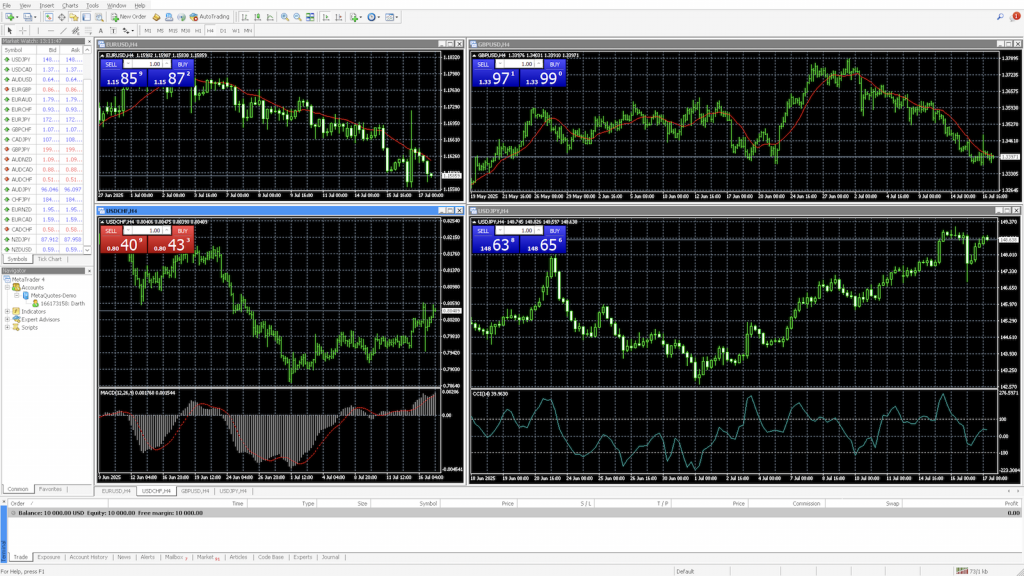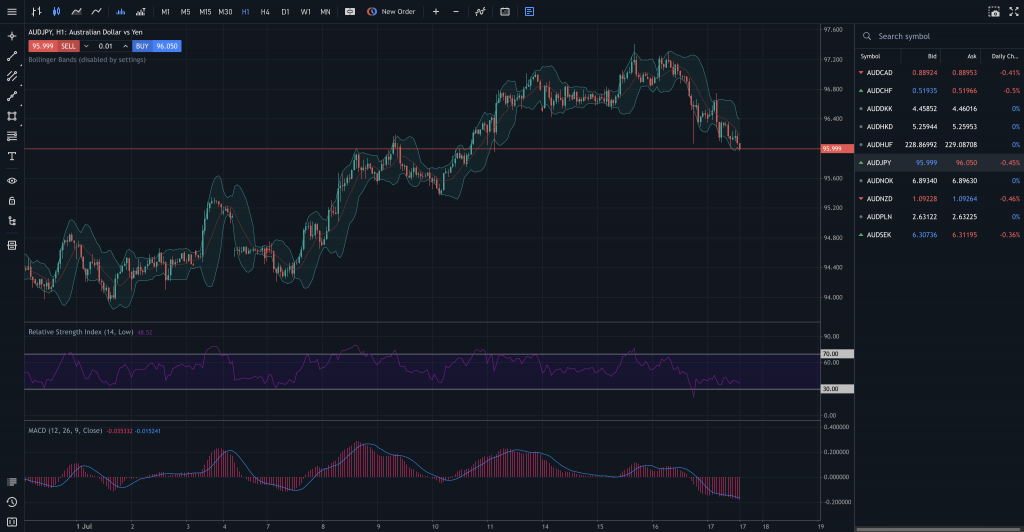Best MetaTrader 4 (MT4) Brokers For Swing Trading 2026


With MetaTrader 4 (MT4) still reigning as the go-to platform for forex and CFD traders worldwide, choosing the right broker can make or break your trading experience.
In this guide, we cut through the noise and spotlight the top swing trading MT4 brokers that combine reliability, low costs, and powerful trading tools.
How SwingTrading.com Chose The Best MT4 Brokers
We log into every broker we review to verify MT4 platform access and assess the trading experience firsthand. Only brokers offering full MT4 support were shortlisted.
We then ranked them based on overall ratings, considering factors like execution speed, fees, tools, and reliability – criteria that matter to serious swing traders.
What Is MetaTrader 4?
MT4 is a longstanding, broker-independent trading platform developed by MetaQuotes, primarily tailored for forex and CFD trading.
Launched in 2005, it has remained a staple for swing traders due to its robust technical analysis capabilities, algorithmic trading support, and highly customizable interface.
While newer platforms like MT5, cTrader, and TradingView have emerged, MT4’s simplicity, speed, and vast ecosystem of tools keep it relevant, especially if you prioritize strategy over novelty.

MT4’s interface combines customizable charts and built-in tools
Why Is MetaTrader 4 So Popular?
MT4’s popularity among swing traders—and the brokers that cater to them—comes down to a rare combination of technical power, flexibility, and market access.
At its core, MT4 provides a streamlined environment for multi-timeframe analysis, which is crucial for implementing swing trading strategies. You can easily switch between daily, 4-hour, and weekly charts to spot broader market trends and fine-tune entry points.
Its built-in indicator library, coupled with the ability to add custom scripts and tools, makes it adaptable to virtually any swing trading method, whether momentum-based, trend-following, or mean-reversion.
This is a significant advantage for swing traders, who often rely on backtested, rule-based systems to minimize emotional decision-making. The platform also supports automated strategy deployment and alerts, allowing you to monitor fewer charts while maintaining control over multi-day positions.
From a broker’s perspective, MT4 is lightweight, stable, and easy to integrate with backend systems, allowing them to offer it with tight spreads, fast execution, and value-added services like VPS hosting or custom plugins.
How To Choose A Top MT4 Broker
Choosing the best swing trading MT4 broker isn’t just about low spreads—it’s about finding the right mix of regulation, execution speed, trading conditions, and platform features that align with your swing trading strategy:
Regulation & Licensing
When selecting the best MT4 broker, regulation and licensing should be top priorities. Trusted financial regulators, such as the FCA (UK), ASIC (Australia), and CySEC (Cyprus), enforce strict standards regarding client fund protection, operational transparency, and financial reporting.
These regulators require brokers to hold client funds in segregated accounts, maintain minimum capital reserves, and undergo regular audits.
Since swing trading involves holding trades over more extended periods than day trading, the risk of exposure to market events, broker insolvency, or price manipulation increases.
Another key benefit of choosing a regulated MT4 broker is access to dispute resolution mechanisms. Regulators like the FCA or ASIC provide formal avenues for lodging complaints if you feel you’ve been mistreated.
This kind of protection is especially valuable in cases involving platform errors, execution issues, or sudden account restrictions—all of which can impact swing traders who rely on precise trade management over time.
Platforms & Devices
MT4 supports a wide range of platforms, giving you the flexibility to manage positions across multiple devices and environments.
The core platform is available for desktop operating systems, including Windows, macOS, and Linux, providing full access to MT4’s advanced charting tools, custom indicators, automated trading via EAs, and comprehensive backtesting capabilities.
MT4 also offers robust mobile support for iOS, Android, and Huawei devices, enabling you to monitor open positions, set alerts, and manage trades remotely from your primary workstation.
While mobile versions are more streamlined and lack advanced features like EAs or custom scripting, they’re invaluable when you need quick access to markets during unexpected price movements or overnight developments.
Additionally, MT4 features a web-based terminal that operates seamlessly in most modern browsers, eliminating the need for installation. Although more limited than the desktop version, it still supports order execution, basic charting, and indicator use, making it a convenient option for secure access from different locations or machines.
Many top MT4 brokers also offer VPS hosting, which is especially useful when running automated strategies that require uninterrupted uptime. This ensures that EAs can execute trades and manage positions even when your device is offline.

MT4 Web Trader provides a clean, browser-based platform with essential tools
Account Types
The most common account types are Standard, Raw (ECN), and Micro, each of which impacts costs and trading style differently.
Standard accounts offer fixed or variable spreads with no commissions, making them cost-effective and straightforward for beginners, though spreads may be wider.
Raw (ECN) accounts offer tighter spreads (sometimes zero) and commissions, making them ideal for experienced swing traders seeking lower costs and faster execution around key market levels. These accounts often require higher deposits but deliver better pricing and transparency.
Micro accounts enable tiny trades, making them ideal for testing strategies with minimal risk. They typically have higher spreads but offer a safe way for newcomers to practice swing trading on MT4.
The best MT4 brokers offer flexible account options to match your capital, strategy, and cost preferences, enabling you to trade efficiently and confidently over the longer timeframes that swing trading demands.
In my experience, starting with a standard account was great for getting comfortable with swing trading, but switching to a ECN account made a noticeable difference in long-term cost efficiency—especially when holding larger positions over several days.
Execution Speed & Reliability
While swing trading doesn’t rely on split-second execution like scalping does, the speed and consistency of trade execution still directly affect entry and exit precision, key elements for capturing multi-day trend movements with minimal slippage.
STP and ECN brokers typically offer faster and more transparent order execution by routing trades directly to liquidity providers without the need for dealing desk intervention.
This reduces the chance of requotes and improves the accuracy of stop-loss and take-profit orders, which are critical for swing traders who often hold trades through volatile sessions, such as market openings or major news events.
ECN brokers, in particular, provide access to raw spreads and deep liquidity, making them ideal if you value tight pricing and fast execution even during off-peak hours.
On the other hand, Market Maker brokers operate as counterparties to their clients’ trades, which can introduce potential conflicts of interest.
While they may offer fixed spreads and better trade execution in low-volatility environments, there’s a higher risk of slippage, requotes, or order delays—especially during high-impact news or periods of low liquidity.
For swing traders whose strategies depend on entering at technically significant levels and exiting with precision, this lack of reliability can erode profitability over time.
Trading Costs
Understanding trading costs—such as spreads, commissions, and swap fees—will significantly impact your long-term profitability.
Spreads are the difference between bid and ask prices—tighter spreads reduce entry and exit costs. ECN accounts offer low spreads plus commissions, while standard accounts have wider spreads but no commissions, so the choice depends on your trade size and frequency.
Commissions on ECN accounts add to costs but often result in lower overall expenses for larger trades or volatile markets.
Meanwhile, swap (rollover) fees matter most for swing traders holding positions overnight, as these interest charges can either add costs or generate credits depending on the trade and currency pair. Some brokers offer swap-free accounts, but these often come with trade-offs.
The best MT4 brokers balance these fees transparently, helping you keep costs manageable over multi-day trades and protect profits.
Deposit & Withdrawal Options
Deposit and withdrawal options are key to smooth account management. Brokers offering multiple funding methods—such as bank transfers, credit/debit cards, and e-wallets like Skrill or Neteller—provide you with flexibility and quick access to funds, which is essential for adjusting capital or taking profits between trades.
Fees and processing times also vary significantly between brokers and payment methods. While some brokers absorb deposit fees, others may charge commissions or currency conversion fees, which can add up over time.
Similarly, withdrawal fees and delays can be frustrating when you rely on timely access to your funds. Brokers regulated by authorities such as the FCA or ASIC typically maintain transparent fee structures and fast processing times, providing you with peace of mind.
Minimum deposit requirements matter too. Reasonable minimums enable you to manage risk effectively without tying up excessive capital. Features such as instant deposits and same-day withdrawals also allow you to react quickly to market changes.
From my own experience, having flexible deposit and withdrawal options has been a significant advantage, especially when I’ve needed to transfer funds quickly between trades. I rely on fast withdrawals after closing swing positions, and brokers that offer smooth, hassle-free processing have earned my trust.
Leverage & Margin Requirements
Leverage allows you to control larger positions with less capital—helpful in capturing multi-day price moves—but excessive leverage can magnify losses during market swings.
Top brokers offer adjustable leverage, allowing you to tailor your risk. Regulated brokers (such as those under the FCA or ASIC) may cap leverage at 1:30, but often offer higher limits for professional accounts.
Margin requirements also matter—sufficient free margin helps prevent forced liquidations during volatile periods.
The best MT4 brokers strike a balance by offering flexible leverage and clear margin rules, along with protections such as negative balance protection and margin alerts, which give you both opportunity and control.
Market Coverage
The best brokers offer a wide range of instruments, including forex pairs, commodities, indices, stocks, and CFDs, enabling you to diversify and find high-quality setups across various markets.
Beyond major forex pairs, access to minors, exotics, and global indices, such as the S&P 500 or DAX, adds flexibility.
Commodities such as gold and oil are also popular due to their strong trends, making them ideal for multi-day trades. Some brokers even offer crypto and stock CFDs, expanding swing trading opportunities.
What matters most isn’t just the number of assets, but the liquidity, pricing transparency, and trading hours. The top MT4 brokers combine broad market access with reliable execution, giving you the tools to capture longer-term moves across global markets.
Trading Tools & Add-Ons
While MT4’s core features are solid, the best brokers enhance the platform with tools like Autochartist, Trading Central, or custom plugins, helping you spot high-probability setups and manage multi-day positions more efficiently.
Autochartist scans charts for patterns and key levels across timeframes, saving time and highlighting strategic opportunities. Trading Central combines technical and fundamental analysis to provide clear entry and exit signals, ideal for swing trading.
Proprietary add-ons often include advanced order types, sentiment indicators, and multi-chart views, which are tailored to longer-term trading.
The best MT4 brokers go beyond basic access, offering integrated tools that sharpen analysis, improve trade management, and support disciplined swing strategies—key advantages for sustained trading success.
Having used MT4 across various brokers, I’ve found that many top-tier ones often enhance the platform with advanced charting tools, custom order types, and built-in market scanners—features that make a real difference for swing trading.
Learning Resources & Market Analysis
Swing trading requires a deeper understanding of technical patterns, market cycles, and fundamental drivers, so brokers that offer comprehensive educational materials—like video tutorials and detailed strategy guides—can help you build the skills needed to identify and manage multi-day trades effectively.
Top brokers also provide regular market analysis tailored to swing trading timeframes, including technical reports, economic calendars, and expert commentary.
These insights enable you to anticipate key market events and adjust your strategies accordingly. Access to live webinars or analyst Q&As can further deepen understanding by connecting you with professional perspectives on market trends.
Additionally, brokers that integrate real-time news feeds and advanced charting tools within MT4 allow you to stay updated and react quickly to changing conditions.
No-Risk Demo Account
A demo trading account allows you to practice strategies and familiarize yourself with the broker’s execution, MT4 platform features, and order types without risking real capital.
For swing traders, testing how a broker handles order execution, slippage, and rollover fees in a simulated environment can reveal crucial insights before committing funds.
Demo accounts also provide a risk-free space to explore different account types, leverage settings, and trading tools offered by the broker.
Since swing trading depends heavily on precise entry and exit points, using a demo helps refine timing and risk management under ‘realistic’ market conditions.
Furthermore, brokers with demo accounts that mirror live trading environments—including spreads, margin requirements, and trade execution speeds—offer the most reliable practice experience.
Help & Support
Brokers offering responsive, knowledgeable support—available via live chat, phone, and email—help ensure that technical or trading disruptions don’t negatively impact your strategy.
Effective support teams understand the specifics of MT4, including advanced order types, custom indicators, and trade management features critical for swing trading.
Brokers that provide dedicated account managers or specialized support for experienced traders can offer tailored guidance, helping you optimize platform settings or troubleshoot complex issues quickly.
Additionally, brokers with extensive online help centers, FAQs, and tutorials complement direct support by enabling you to resolve common problems independently.
I’ve had moments where account or platform questions came up while holding swing trades, and solid support made all the difference. It’s reassuring when a broker’s team responds quickly and actually understands the technical side of MT4—not just reading from a script.
Bottom Line
To select the best swing trading MT4 broker, look for a combination of regulation, low trading costs, and reliable execution that aligns with your swing trading style.
Choose a broker with multiple account types, flexible leverage options, and access to a broad range of markets and instruments.
Prioritize firms that offer strong trading tools, insightful market analysis, and responsive customer support. A risk-free demo account is also essential for testing strategies before going live.
The right MT4 broker should not only meet your technical needs but also provide a stable, transparent, and well-supported trading environment.
FAQ
Should I Use MT4 Or MT5?
MT4 is ideal for swing traders who value simplicity, speed, and access to a wide range of custom indicators and EAs. It’s widely supported and easy to use.
MT5 offers more features—such as additional timeframes and deeper market access—but isn’t fully compatible with MT4 tools. If you rely on established MT4 setups, it’s best to stick with them. Otherwise, MT5 is worth considering for broader functionality.
Can I Use MT4 & MT5 Accounts Simultaneously?
Yes, you can use MT4 and MT5 accounts simultaneously, but they operate on separate platforms and aren’t interchangeable.
You’ll need to download each platform individually and open separate trading accounts with a broker that supports both.
While you can’t use the same login for both, you can run them side by side to take advantage of each platform’s unique features. Just be aware that indicators and EAs built for MT4 won’t work on MT5, and vice versa.
